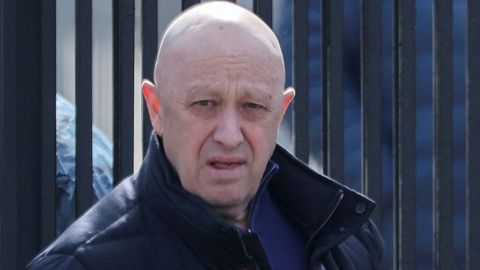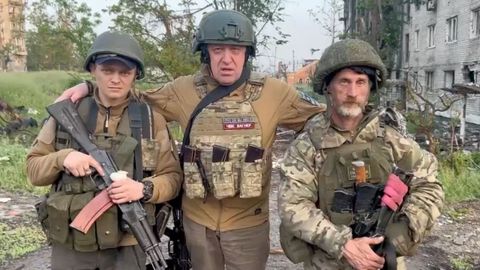
Yevgeny Prigozhin in an archive picture JULIJA MOROZOVA | Reuters
The head of a mercenary group has rebelled against the Russian military leadership and claims to control the city of Rostov
Yevgeny Prigozhin From an ally, he becomes a great enemy of Vladimir Putin. Born in 1961 in the former Leningrad, now St. Petersburg, he is a product of Russia’s transformation, a street-schooled and born survivor fueled by the far-reaching political and economic changes the country underwent in the 1990s, an ecological savage who enabled such radical transitions as the one was experienced by the leader Wagner’s mercenary groupformer hotelier.
Prigogine’s first major experience with the system occurred in 1981 when, at the age of 20, he was sentenced to 13 years in prison for robbery, nine of which he spent behind bars. When he was released from prison, Prigozhin found a different world. He was released in 1990, after the collapse of the Soviet Union, a country of opportunism in which the Wagner leader began to prosper by selling hot dogs. In just five years and after buying part of the supermarket chain, In the end, he opened his own restaurant.
The place was the epicenter of the network of contacts that Prigozhin would build over the next few years as he expanded his business. One in particular: New Island, a ship that sailed on the Neva River, where the President of Russia, Vladimir Putin began to lead his guests.
Prigozhin, in an interview collected by the BBC, tentatively places his first meeting with Putin around April 2000, at the beginning of his presidential term, during the visit of the then Japanese Prime Minister Yoshiro Mori. Three years later, Putin will celebrate his birthday on Prigozhin’s ship.
The first phase of the relationship between the two was purely commercial in nature. Prigozhin founded the catering company Concord, with which the Kremlin contracted to supply food to the army and state schools in the country, and the Wagner leader remained more or less in the background for the next decade.
A leaked document from the Russian law firm Capital Legal Services, which counted Prigozhin among its clients, states that the Wagner boss spent the 2000s in the hospitality business through Concord. Absent from this biography, collected by the portal The Interceptyet his decisive turn towards an arms deal with a mercenary group foundationwhich first became public in 2014.
diary sources Guard Collected by Europa Press points out that Wagner’s creation had a lot to do with the concept of “plausible deniability”, since at the time Russia had declared private military companies illegal. “I think it was Prigozhin who asked Putin that question directly. Russian military intelligence may have been involved, but I doubt this project was entirely in Prigozhin’s hands,” said a former Russian defense ministry official, speaking on condition of anonymity.

Yevgeny Prigozhin, middle, during the invasion of Ukraine PRESS SERVICE “CONCORD\ | REUTERS
The ministry gave Prigozhin land in Molkin, in southern Russia, the group’s first training base, which began to grow in importance from there. First, by intervening on behalf of the separatists in the Ukrainian region of Luhansk, to later expand to Syria – where Russia acted as an ally of Damascus in the civil war – and from there to Africa, where it acts as the armed wing of the military to the US and its allies juntas that have come to power in recent years, such as in Mali.
The United States also accused Prigozhin of organizing groups trolls online for meddling in the 2016 US election through a series of Facebook and Twitter campaigns in favor of Donald Trump.
After years of rejection, and now in full Ukrainian warPrigozhin eventually confirmed that he founded the mercenary group in 2014, a decision that gave the organization a face and made him a star on social media, where he constantly announced the group’s operations against Ukrainian forces.
However, as the months passed, his rejection of the strategy proposed by the Russian Defense Ministry, which he accused deprive his men of ammunition during campaigns as intense as the one in the city of Bakhmut, which caused the current crisis.
Source: La Vozde Galicia
I am Amelia James, a passionate journalist with a deep-rooted interest in current affairs. I have more than five years of experience in the media industry, working both as an author and editor for 24 Instant News. My main focus lies in international news, particularly regional conflicts and political issues around the world.







